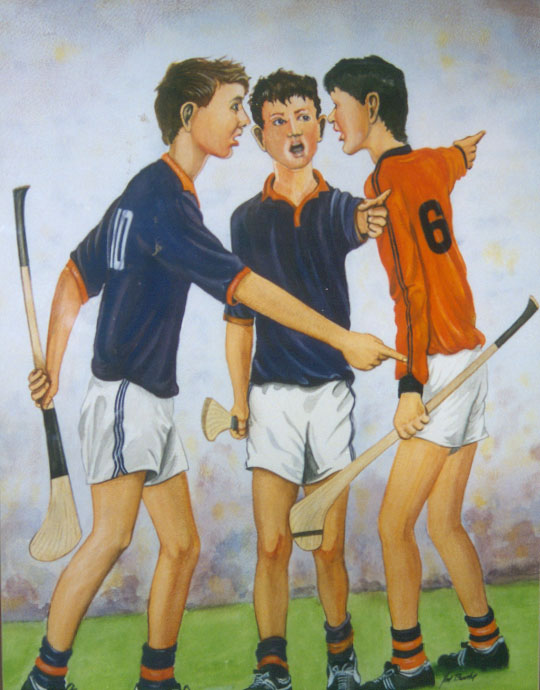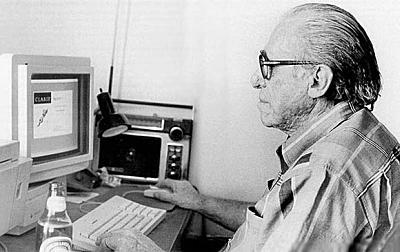
"You're an artist Clifford, it's your job to give offense." - Jennifer Wallace, character from Martin Crimp's
The Treatment.
And that's the bottom line...I try to rebel against that idea. It's not impossible to write literature that doesn't offend yet still challenges and stimulates an audience.
When looking at comedy for example, even though it can't be taken seriously (no matter how much the comedian tries to assert that they're making a dire statement), there's comedy that directly offends other people (for example Don Rickles) and comedy that doesn't attempt to provoke and offend and is just as popular without becoming pablum (for example Mitch Hedberg RIP).
If this is true of one "artform" then it should be true of all of them. If comedy can hold this dichotomy, then so should literature, painting, et al..
To write and challenge without offending is a non-conformist idea to me. What I hold valuable in writing is the concept of appealing to audiences without creating unnecessary offense or barriers between people. I don't try to write wild claims in my work that I can't back up solidly just to get attention.
This is one of my golden rules when trying to create effective literature, whether it's successful or not time will tell. But then there are other maxims for success (in a lot of the business world, at least) which have translated sucessfully into art that I have trouble with...
...for example, "sex sells" and "anxiety sells", with the former being more well-known. To incorporate both ideologies into art - but in a manner that creates inspiration and knowledge rather than insecurity - isn't an implausible direction for me to work towards.
The "sex sells" attitude is detrimental in my mind to progression as an author. I have nothing against sex itself, no hesitation, disgust, perversions, dismissal. A lot of people say they have no issues with sexuality, but they still harbour discomfort surrounding it. I'm heterosexual but I believe in rights for homosexuals and women. I wish sex was a part of my everyday life to tell the truth, and that's not because of the fact that I'm twenty-five either. To me it's integral to health and to relationships...but it seems to me that sexuality has been tarnished by an overabundance of media regarding it, as well as it sinking so quickly into humour. Its meaning can become dulled as a result.
I don't take sexuality completely seriously (as should be the case), but I think its power, importance and its complexity is diminished by an unceasing flux of media content which exists mainly to generate profits. It's common sense that too much of anything doesn't result in positivity. Yet since it's an integral part of life (as should be the case) it needs to have a place in art. What sort of place it has, and should have, in today's society needs to be taken into deep consideration by artists.
"Anxiety sells" when it comes to aging, comfort in your home, countless other issues...the problems that could arise or be there already, but you don't know, but buy this product just in case they happen, or buy this product to save time because time is money...
...and it's easy to get caught up in this. I recently bought tea tree oil for my hair because I'm worried about losing it from stress, and I think it's healthy to use. Will it work? Time will tell. Are natural health products a huge goldmine which all stem from fostering anxiety? Does just thinking you have a problem lead to you having an actual problem? Paranoia should never be the only sane state of mind...it shouldn't exist at all. No one told me or suggested that I'm losing my hair, or to buy tea tree oil - it was all by my own volition. And I'm not saying that health and beauty products are unnecessary, they can definitely be beneficial. Only in cases where a business will convince people that their lives are lacking without certain products, and trying to foster instability and a sense of self-loathing which can be cured by buying their merchandise, pressuring people to consume and not allowing them freedom of choice is what's repulsive.
I haven't separated myself from regular consumer choices. I choose not to purchase certain products, yet I still own pairs of Nike shoes, I still wear clothes with logos, and it's rare but I'll go to malls if I need something like electronics or dress shoes. I don't see doing so as being tricked into supporting devilish industries. But I still try to stay aware of what I buy and what shops and industies I support because it's incumbent on me as an educated member of society. Most advertising depresses me and I choose to ignore it, for example the ad which starts this post and promotes violence against women. But when I saw the ad pictured below for the first time, it gave me some hope for the future of the advertisement industry.

There are people who would completely do away with the ideas that sex and anxiety sell and strive to create meaningful art without their backing. If this has been attempted and it works (outside of children's literature that is), then I'd applaud the author who managed it...
...and simultaneously ask the question, did they do so just to be different from everyone else to try and achieve attention that way, or did they have a genuine interest in subverting creative norms?
And is the attention they might receive a result of the public as a whole becoming sick of how much sexual content and anxiety are inundating society, or would it be based on the right timing, a welcome change of pace that opens people's eyes before they inevitably close, to go to sleep once again?




































